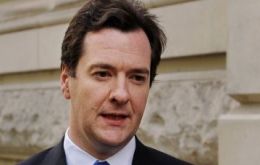MercoPress. South Atlantic News Agency
Tag: Bank of England
-
Tuesday, June 7th 2011 - 03:27 UTC
IMF backs UK plan to reduce deficit but warns on weak growth

The International Monetary Fund backed the British government's plans to reduce the budget deficit, but said tax cuts or more quantitative easing may be needed if growth proves persistently weak.
-
Thursday, April 7th 2011 - 20:07 UTC
Bank of England priority list has recovery before inflation: rates unchanged

The Bank of England’s Monetary Policy Committee (MPC) has decided to retain the United Kingdom’s interest rate at 0.5%. The rate, the lowest in the Bank of England’s history, has now been unchanged for over two years despite speculation that higher rates may help combat inflation.
-
Thursday, March 24th 2011 - 06:32 UTC
Bank of England remains divided 6 to 3 on interest rate hike

Six members of the Bank of England’s nine-strong Monetary Policy Committee, including Governor Mervyn King, continued to oppose the minority campaign for an immediate rise in benchmark UK interest rates at the MPC’s meeting two weeks ago, minutes revealed Wednesday.
-
Friday, March 11th 2011 - 01:48 UTC
In spite of inflation, Bank of England leaves interest rates at record low 0.5%

UK interest rates have been held again at their record low of 0.5% by the Bank of England's Monetary Policy Committee. There has now been no change to the Bank rate for two years, despite the fact that inflation is currently twice the Bank's target rate.
-
Thursday, February 10th 2011 - 23:24 UTC
Bank of England at a crossroad leaves interest rates on hold at 0.5%

Bank of England's Monetary Policy Committee (MPC) has kept UK interest rates on hold at 0.5%, and unveiled no new quantitative easing (QE) measures.
-
Thursday, December 9th 2010 - 15:34 UTC
Bank of England decision on further liquidity injection expected for February

The Bank of England’s monetary policy committee (MPC) voted Thursday to hold the base interest rate at its record low of 0.5%. As expected, the Bank did not extend its £200 billion program of quantitative easing and is not expected to make a decision on whether to follow the US Federal reserve with a second bout of economy boosting bond-buying – or QE2 – until February.
-
Thursday, November 18th 2010 - 18:51 UTC
UK banks’ exposure to Irish lenders above £ 139 billion

Ireland's banking problems are likely to have a direct effect on the United Kingdom's battered institutions. According to the Bank of International Settlements, UK banks have a total exposure to Irish lenders of 222 billion US dollars (£139bn).
-
Friday, September 10th 2010 - 03:45 UTC
Bank of England leaves interest rates on hold at 0.5% for 18th month running

The Bank of England has kept UK interest rates on hold at a record low of 0.5% for the 18th consecutive month. The Monetary Policy Committee's (MPC) decision had been expected, but calls have been growing for an increase in rates to curb inflation.
-
Wednesday, August 18th 2010 - 19:11 UTC
Bank of England warns about high inflation; rate won’t drop to 2% until mid 2012

The Governor of the Bank of England warned of the dangers of ‘destructive’ high inflation after admitting his surprise that the rise in the UK cost of living continues to overshoot targets, according to a report in the Daily Mail.
-
Friday, August 13th 2010 - 02:40 UTC
UK faces “choppy recovery” in the next two years warns Bank of England

The UK economy faces a “choppy recovery” over the next two years, the governor of the Bank of England, Mervyn King, has warned. His comments came as the Bank lowered its economic growth forecast and said inflation would stay higher for longer than previously forecast.
